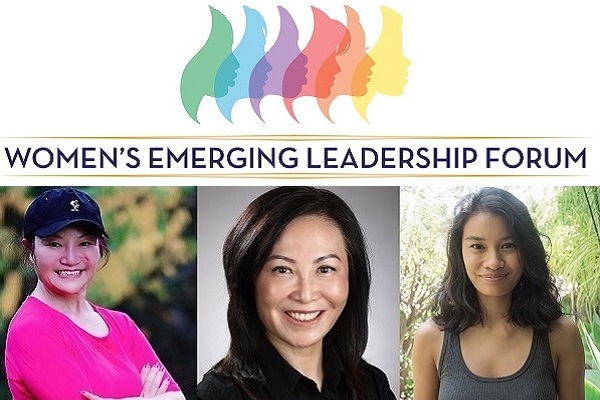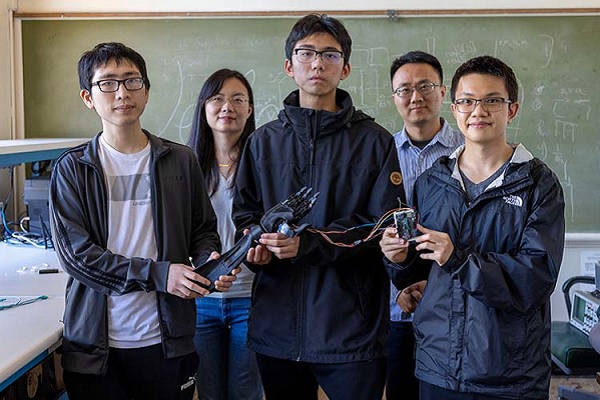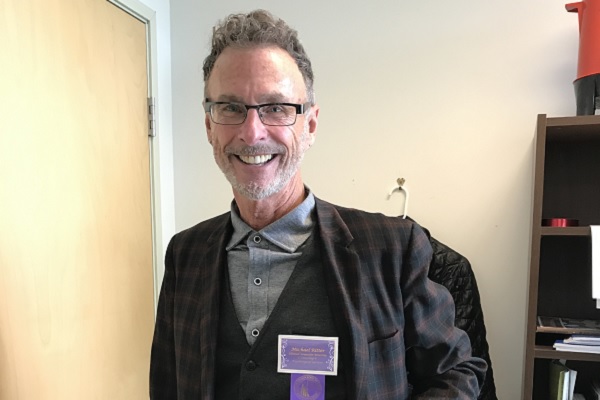News & Announcements

SF State launches its Climate Justice Leaders Initiative (CJLI) to better equip the University’s powerfully diverse student body to become climate justice leaders who center their work around equity. The overarching goal of the initiative is to build leaders who understand the inequities of climate change and who can advocate for and create strategies that include the communities most vulnerable to the climate crisis.
“Our campus is diverse, meaning many of our students have lived experiences of dealing with climate change inequities,” said Kai Burrus, co-director of the Climate HQ campus hub that promotes and supports climate-related activities across the University, including CJLI. “This initiative helps students draw from their experience and combine that with academic training to fight climate change on behalf of their communities across California and the world.”
CJLI is also interdisciplinary, bringing students and faculty together across different majors and academic colleges to address the climate crisis. The initiative is designed that way because climate change is a multifaceted, complex issue that requires people with different skills working together. Yet people tend to work in siloes, and those that have the skills critical to fighting climate change are often overlooked.
Key CJLI programs that will roll out over the next five years include:
- A 12-unit Climate Justice Education Certificate for pre-K-12 teaching
- Expansion of the recently launched Interdisciplinary Certificate in Climate Change Causes, Impacts and Solutions
- Creation of a new Metro College Success Program advising pathway for climate change
- Expansion of course offerings
CJLI’s launch will be supported by a generous grant from SF State Foundation Board Chair and alumna Neda Nobari.

The Lam Family College of Business is hosting its Eighth Annual Women’s Emerging Leadership Forum as an in-person event from 9:30 a.m. to 2:30 p.m. Thursday, Oct. 13. With the theme “Blazing Your Path,” this year’s event will feature stories and hard-earned reflections from women who have achieved the pinnacle of their profession. Through 9 a.m. Thursday, Oct. 6, tickets are available at a special two-for-one price. All ticket sales will close at 9 a.m. Monday, Oct. 10. Buy tickets now on Eventbrite.
This year’s keynote speakers will be Carine Schneider, president of AST Private Company Solutions Inc., and Gulnur Tumbat, professor of Marketing and Lam-Larsen Community Initiative Director for the Lam Family College of Business. A panel on the topic “Create Your Own Path: Thrive During Change and Uncertainty” will feature (pictured, left to right) Cathy Peng, CEO of ROCS Global Inc.; Lucy Chen, vice president of Claris FileMaker Platform Engineering at Apple; and Rosey Alvero, senior director of people for SoCal Wanderer.
Learn more about the schedule and speakers on the Lam Family College of Business website.

In June, five SF State research students, brought together by a shared interest in artificial intelligence, began collaborating on a summer engineering research project. Just 10 weeks later, the budding engineers earned one of three grand prizes in a virtual Sony-sponsored competition. Their winning project — a deep learning-based bionic arm — is a prototype for a prosthetic that could be used by patients after a stroke or amputation.
Assistant Professor of Computer Engineering Zhuwei Qin and Associate Professor of Computer Engineering Xiaorong Zhang mentored the research team of two SF State master’s students, two undergraduates and one local high school senior. Their project was among 49 submissions to the contest, competing against projects created by 500 international participants ranging in age and expertise.
“This project is unique for two reasons. The entire control system, for the first time, was implemented in a tiny edge device [Sony’s Spresense microcontroller] that can process electromyography signal in real-time,” Qin said. “We also introduced a deep-learning algorithm on the microcontroller, which is usually done on high-performance desktops, not on low-power devices.”
Building on the faculty’s earlier work, this new system collects muscle-generated electrical activity (electromyography signal) from a patient’s arm. The data is fed to the Sony microcontroller that uses a form of artificial intelligence called deep learning to predict and generate the patient’s desired arm gestures in real time.
Traditionally, deep-learning algorithms — computer models that can learn tasks done by humans — need an expensive high-performance desktop computer that requires high-power consumption and is not portable.
“[Deep learning-based systems] are way too expensive for a lot of people, especially because deep learning is very demanding,” said student researcher Jimmy Lu, a Lowell High School student. “Utilizing the computation for an embedded system with the Sony Spresense microcontroller, we could easily bring that price down.”
Go to SF State News to learn more and see video of the bionic arm in action.
Open Enrollment ends on Oct. 14, and late submissions cannot be accepted. If you have changes to your benefits, such as switching health plans, adding family members, reenrolling in your Flexible Spending Account or adding pet insurance, now is the time to get your forms in to Benefits via DocuSign. Changes made during Open Enrollment will take effect on Jan. 1, 2023.
View an overview of health plan changes on the CalPERS website and check the 2023 CalPERS Health Benefits Basic Plan Rates on Box.
Academic Planning invites departments, schools and programs to participate in a project to assess the oral communication skills of students in majors courses this year. Additionally, departments, schools or programs interested in assessing a different core competency can apply for support to do that assessment work.
Ideally, teams of two faculty will work on this project. Requirements include: use assignments from course(s) where students in your major demonstrate/apply the core competency being assessed; attend workshops in the fall to plan the assessment project in a peer-learning environment; carry out the assessment in January; analyze and present the results to your department, school or program in the spring; and submit a report about what you learned in April. Faculty will be compensated $1,000 for participation in this project, with a maximum award of $2,000 per department, school or program.
To sign up, provide information about your core competency assessment project via Qualtrics by Monday, Oct. 17. For more information, contact Jane DeWitt at dewitt@sfsu.edu.
Multi-Factor Authentication (MFA), also known as two-factor authentication (2FA) and two-step verification, is a security measure that requires anyone logging into an account to navigate a two-step process to prove their identity. It makes it twice as hard for criminals to access an online account. When it’s available, always turn it on because it’s easy to do and significantly increases your security. Check out more helpful tips on the Information Technology Services Week 1 webpage. This is a great way to “See Yourself in Cyber!” (the theme of this year’s Cybersecurity Awareness Month).
The SF State Safe Zone Ally program is looking for staff, faculty and administrators to become safe zone allies for the campus LGBTQ+ community. The Safe Zone Ally program’s mission is to foster a welcoming, inclusive and equitable campus environment by building a support network for people of all gender and sexual identities. Safe Zone allies are active and visible volunteers who are open to talking to members of the LGBTQ+ community in a confidential and supportive environment. To become a Safe Zone ally, volunteers must complete a Safe Zone Ally training. Several Safe Zone Ally trainings are offered throughout the year. The next training will be held virtually in two parts (and participants must be able to attend both): Friday, Oct. 28, from 1 to 4 p.m. and Friday, Nov. 4, from 1 to 4 p.m. For further details about the training and in order to register, please RVSP to Rick Nizzardini at rnizzard@sfsu.edu. (You must pre-register in order to participate.) You can also get more information about the Safe Zone Ally program by checking out its website.
SF State staff and faculty are invited to join the FitPlus program! The team’s goal is to promote health and wellness to SF State employees. They offer an array of workouts, including Weightlifting 101, HIIT to FIT, Dance Cardio, Swimming Conditioning, Yoga, Pilates and more. They also offer one-on-one training. You can join them in person at the gymnasium or via Zoom!
Don’t miss out on upcoming special events, classes and wellness tips. Visit the FitPlus website or Instagram page to get more information (including the program’s weekly schedule) and start your journey to healthy habits. Questions? Please email John Penacerrada.
The SF State Academic Senate will meet Tuesday, Oct. 4, from 2 to 4:30 p.m. virtually via Zoom for its third meeting of the academic year. To attend please contact the senate office at senate@sfsu.edu for a Zoom link. The agenda includes:
- Recommendations from the Executive Committee: Resolution on Campus Response to Intersegmental Committee of Academic Senates (ICAS) Cal-GETC Proposal, in first reading.
- Recommendations from the Executive Committee: Proposed CEL Name Change, in first reading.
- Recommendations from the Curriculum Review and Approval Committee (CRAC): Master of Science in Business Analytics, in second reading.
- Recommendations from the Curriculum Review and Approval Committee (CRAC): Master of Business Administration, in second reading.
- Recommendations from the Curriculum Review and Approval Committee (CRAC): Master of Arts in Classics, in second reading.
- Recommendation from the Curriculum Review and Approval Committee (CRAC): To Change the Minor in Management from 21 to 15 units.
- Recommendations from the Student Affairs Committee (SAC): Resolution in Support of Voter Registration Campaign and the Ballot Bowl, Fall 2022, consent item.
- Presentations from:
- Gretchen LeBuhn, chair of University Research, Scholarship and Creative Activities Council, “URSCA updates.”
- Guisselle Nuñez, AVP Strategic Marketing and Communications, “My Story” marketing campaign roll out.
The full agenda, meeting materials and minutes can be found on the senate website.
The SF State University Police Department is excited to be hosting a “Coffee with a Cop” event from 10 a.m. to 1 p.m. Wednesday, Oct. 5, in the plaza level of the Cesar Chavez Student Center. The event provides a unique opportunity for the campus community to ask questions and share ideas over a free cup of coffee.
A representative of the Fulbright U.S. Scholar Program will be on campus to answer questions about opportunities abroad for faculty and administrators. The information session will be held from 2:30 to 4 p.m. Thursday, Oct. 6, in LIB 121. With over 800 awards annually in more than 135 countries to teach, conduct research and carry out professional projects, you can find the right Fulbright opportunity for you.
American Indian Studies Department Chair and Associate Professor John-Carlos Perea will perform a program of solo Native American cedar flute songs from 1 to 2 p.m. Monday, Oct. 10, in Knuth Hall. The free program will include original compositions and arrangements of works by Coltrane, Ellington, Ayler and Jordan. Featured guests will include graduate students in Music from SF State and UC Berkeley. Learn more on the School of Music website.
Prospective students are invited to a Thursday, Oct. 13, information session to learn about Department of Child & Adolescent Development (CAD) undergraduate programs, opportunities for CAD students and admissions. The session will be held from 5:30 to 6:30 p.m. on Zoom. Learn more and RSVP for a Zoom link on the CAD website.
Over 70 departments at six CSU campuses — including 13 departments at SF State — have spent three years reviewing and redesigning their majors for greater student success. You are invited to hear about their strategies, lessons and successes, which will be highlighted in an informative and empowering online symposium from 9 a.m. to 12:30 p.m. Friday, October 14. Join the event to learn about enhancing diversity, equity and inclusion through the curriculum, building curricular coherence and getting stakeholder input and buy-in. Registration is free. RSVP on the Undergraduate Education and Academic Planning website by Monday, Oct. 10.
Paradox: New Moves Student Choreography Showcase will present the advanced composition/choreography class and their investigation and concepts of the human condition. To be presented Thursday, Oct. 20, through Sunday, Oct. 23, in the Little Theatre, the showcase offers a glimpse into students’ most private thoughts and most profound convictions. The themes explored include familial dynamics, political response, gratitude to mentors, cultural mosaics and belonging. The Thursday, Friday and Saturday evening performances begin at 7 p.m.; the final performance Sunday, Oct. 23, will begin at 4 p.m. Tickets are $5. Buy now via Simpletix.
This show is the first of three student productions being presented this fall by the School of Theatre & Dance. The season also includes the plays “Dealing Dreams” by Jeffrey Lo and “Doubt: A Parable” by John Patrick Shanley. Watch CampusMemo for more details.
SF State received $3,148,573 in grants and contracts in August 2022.
- Charli Sakari, Physics and Astronomy, National Science Foundation, RUI: Collaborative Research: Characterizing Metal-Poor Stars in the APOGEE Survey, $218,572
- Stephanie Claussen, Engineering, National Science Foundation, Collaborative Research: IRES Track I: US-Kenya Collaboration to Foster Underrepresented Students’ Capacity in Community-Based Engineering Education Research, $119,867
- Gwen Allen, Art, National Endowment for the Arts, Reflection on Ruth Asawa’s Garden of Remembrance, $50,000
- Stuart Siegel, SF Bay NERR Program, Elkhorn Slough Foundation, Resilient Roads and Reserves: Opportunities for Improving Habitat and Access in California, $17,400
- Stuart Siegel, SF Bay NERR Program, National Oceanic & Atmospheric Administration, SF Bay NERR Operations Grant, $780,500
- Michelle Jungbluth, Estuary & Ocean Science Center, National Science Foundation, Collaborative Research: Zooplankton restarts in a high-latitude marine ecosystem: species-specific recruitment and development in early spring, $350,839
- Martha Kenney, Laura A Mamo, Martha Lincoln, Julietta Hua, Department of Women and Gender Studies, National Science Foundation, Research Ethics in STEM: Network Building and Graduate Student Training, $297,801
- Tao He, Mathematics, National Science Foundation, LEAPS-MPS: Statistical Learning on Next Generation Sequencing of T/B Cell Receptor Repertoire Data, $245,681
- Alejandro Velez Melendez, Biology, National Science Foundation, CAREER: Towards a complete picture of communication in anthropogenic noise — Auditory processing among urban and rural soundscapes, $793,165
- Maricel Santos, English Language and Literature, University of California San Francisco, CDC Health Disparity Grant: English as a Second Language (ESL) Program Implementation, $69,250
- Leticia Marquez-Magana, Biology, National Science Foundation, HSI Planning Project: Shifting perspectives about why women of color are underrepresented in biology: the role of intersectional identities, $199,998
- Shandy Hauk, Mathematics, San Jose State University, Equity and Access in Discrete Mathematics, $5,500

Emeritus counselor faculty and alumnus Michael Ritter (M.S., ’84) passed away unexpectedly at the age of 67 on Sept. 16. He was training for his eighth Alcatraz swim scheduled for Oct. 1 to raise funds for the Continue the Dream for Academic Excellence Scholarship, created to benefit undocumented college students. He was passionate about working with marginalized communities, particularly those impacted by homophobia, racism and other forms of oppression.
Ritter was a dedicated educator, counselor and social justice activist. His many contributions include work with the LGBTQ+ community, the Palestinian community, the Academic Senate of the CSU and the California Faculty Association (CFA). Most noticeable were his accomplishments serving as program director of Prevention Education Programs (PEP) within Counseling and Psychological Services (CAPS). He ensured students had access to information, counseling and resources on HIV/AIDS alcohol and other drugs, and sexual violence. He was also a lecturer in the Department of Counseling and touched many lives through all the years of teaching. He retired in 2016 after 32 years of service.
Ritter embodied the spirit of SF State and the wider San Francisco community. He was warm, compassionate, generous and kind. His nonjudgmental approach helped people develop compassion for themselves. He lived life every day to the fullest and died doing what he loved, in the place he loved, with people that he loved, and for a cause that he loved.
“Michael is loved by so many colleagues and alumni in the Department of Counseling and the loss ripples deeply with us. We fondly remember his warmth, energy and tremendous clinical expertise,” said Department of Counseling Chair Rebecca Toporek. “We had the fortune of his collegiality and leadership in an undergraduate peer counseling program in a partnership between Counseling and Psychological Services and the Department of Counseling. Through that, he not only taught the courses but also supervised and mentored many of our graduate students who assisted with the class while interning as mental health counselors on campus at the Peggy Smith Clinic. Teaching the peer counseling classes, Michael also had a powerful influence on students in our Counseling minor who aspired to become peer counselors, and many eventually apply for graduate training in counseling. Michael greeted every one of us with a warm smile, good humor and compassion. His spirit will continue to be strong with us.”
Ritter is survived by his spouse, Peter Toscani, and sister, Karen Ritter. Memorial services are currently in the planning stages for November, and information will be widely shared when it is available.
On Sept. 21, Professor Emerita of Kinesiology and gymnastics coach Andrea Schmid-Shapiro passed away in her Novato home. She was 88.
Born in Hungary, Schmid-Shapiro competed in the Olympics for her homeland in 1952 and ’56, earning a gold medal, two silvers and a bronze. She defected to the U.S. in 1956 and went on to earn a bachelor’s degree in physical education and a Ph.D. in higher education from UC Berkeley. She came to SF State in 1963, serving as head coach of the women’s gymnastics team and teaching as a professor of Kinesiology. She was inducted into the USA Gymnastics Hall of Fame in 2001.
Schmid-Shapiro is survived by her husband, Charles Shapiro; her daughter, Aniko Molnar; and two granddaughters.
Spotlight
Last week Persis Karim, Neda Nobari Distinguished Chair and director the Center for Iranian Diaspora Studies, gave an interviews with the San Francisco Chronicle and Washington Post and appeared on KQED-FM’s “Forum.”
“People are fed up in Iran,” Karim said in the Chronicle story, published Sept. 25. “They are fed up with the repression. They are fed up with the economic situation. They are fed up with the corruption they see with their own government and the inability to participate in some kind of localized policy changes.”
Provost Emerita Sue Rosser is one of two virtual visiting scholars for 2022 – 2023 at the ARC Network. Funded by the National Science Foundation ADVANCE Program, the network seeks to achieve gender equity for faculty in STEM disciplines. Rosser is charged with completing metasyntheses and meta-analyses of existing literature on topics relevant to equity in STEM.
Claire Sears, associate professor of Sociology and Sexuality Studies, was a guest on “The Sex Ed Show” on KOOP-FM in Austin, Texas, on July 26. Among other things, they discussed their class about punishment and social control.
“A lot of sociologists focus on what they call deviant behavior,” Sears said. “... But in my class, we do something different in that we switch focus to the ways that people in power respond, with a particular focus on criminalization.”
In an Aug. 17 story in Metro Silicon Valley, Sears discusses their book “Arresting Dress: Cross-Dressing, Law and Fascination in 19th-Century San Francisco” (Duke University Press, 2014). “We can be mindful of the terminology we use, while also recognizing continuities in trans experiences across time,” they said.
On Sept. 22, Sears presented “Clothing, Coding and Defiance in the 19th-Century West” at the Autry Museum of the American West in Los Angeles. They also participated in a panel discussion with Molly Ratermann, director of “The Cosmopolitan West.”
Linda M. Platas, associate professor and chair of Child and Adolescent Development, and Chelsea McNutt, Child and Adolescent Development academic office coordinator, hosted a workshop at the annual Teach for the Bay virtual conference. The workshop, held Sept. 30, provided information on the teacher preparation programs in the department for community college students, high school students, educators and future educators.
Teach for the Bay is a consortium of community college-based teacher preparation programs in the Bay Area.
Women and Gender Studies Professor and Chair Julietta Hua and Professor Kasturi Ray presented “Choice or Chance? Driver-Labor and Reproductive Justice” at Barnard College’s Center for Research on Women in New York City on Sept. 29. They discussed their book “Spent Behind the Wheel” (University of Minnesota Press), which explores working conditions and wages for ride-hail drivers as well as the role of prejudice.
Their presentation uses a “reproductive justice lens to understand the gendered and racial conditions of labor that structure the passenger ride-for-hire industry, whether taxi or gig. ... Reproductive justice entails an examination of how passenger driving industries draw upon eugenic logics to exploit and, in many cases, manufacture antagonisms between passengers and drivers, while masking their own roles in the making of the many crises of privatized transportation.”
On Sept. 30, NeuroRegulation published “Healing back pain,” an article by Recreation, Parks and Tourism Professor Erik Peper, student Jillian Coby and alumna Monica Almendras.
The article is a case study of a 28-year-old SF State student who had suffered numerous injuries in a motorcycle accident. Following two surgeries, she continued to take prescription medication to control her pain until she learned in an SF State Holistic Health class how to implement self-healing imagery and other self-regulation strategies. At the 18-week follow-up, she was pain-free.
San Francisco is home to the richest renters in America, according to an analysis published by San Francisco Standard on Sept. 27. It is due to the fact that the city’s exorbitant real estate prices keep home ownership out of reach for even people with high salaries.
Urban Studies and Planning Professor Ayse Pamuk notes the effect this has on renters in lower income brackets. About 42% of the city’s occupied rental units include residents who contribute more than 30% of their income toward rent. Housing researchers deem this to result in unaffordable rents, Pamuk explained.